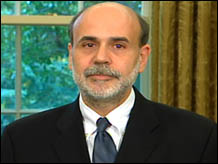|
|
|
|
|
|
|
|
|
|

|
| President Bush nominates his chief economic adviser, Ben Bernanke, to succeed Alan Greenspan as Federal Reserve Chairman. (October 24) |
Play video
|
|
|
|
NEW YORK (CNN/Money) -
Bond prices fell and yields rose Monday after President Bush nominated his chief economic adviser, Ben Bernanke, to succeed Alan Greenspan as head of the Federal Reserve.
The dollar fell against the euro and the yen.
The benchmark 10-year note lost 15/32 to 98-14/32 to yield 4.45 percent, up from 4.39 late Friday. Before talk rippled through markets that Bernanke would be the new Fed chief, the 10-year was down only 4/32 of a point.
The 30-year bond sank 29/32 to 110-16/32 to yield 4.66 percent, up from 4.60 the previous session. Bond prices and yields move in opposite directions.
In shorter-dated debt, the two-year yield was little changed, down two ticks to yield 4.24 percent. The five-year note fell 8/32 to yield 4.32 percent.
President Bush said Friday that Ben Bernanke was his choice to take over the Fed helm once Alan Greenspan retires early next year.
Stocks rallied on the news, as Bernanke, who was a Fed governor before becoming Bush's chief economic adviser in June, is viewed as someone who will carry on Greenspan's inflation-fighting policies.
But Treasuries sold off on concerns over how Bernanke will lead in the months ahead.
"Right now, you have Treasuries losing ground on the element of uncertainty in any transition -- though Bernanke is a known quantity and everyone knew we were losing Greenspan at the end of January," John Canavan, a bond market analyst at Stone and McCarthy Research Associates, told Reuters.
Some anxiety surrounding Bernanke comes from his stance on inflation targets, which would tie decisions on whether to raise rates to specific inflation levels. Some in the bond market worry that such a policy is not flexible enough to keep inflation under control.
Those concerns were evidenced by the selloff, which occurred across the yield curve but remained concentrated at the back end. While shorter-dated debt tends to be more sensitive to short-term interest rates set by the Fed, long-range paper is set more by inflation expectations in the bond market.
Inflation hurts bonds, as it erodes the value of the fixed-interest-paying investment.
Several analysts had predicted that long bond prices would drop for a short period no matter who the president nominated, simply because the new chief would have to prove himself to be as effective a leader as Greenspan.
Treasury prices had dipped earlier in the session as lower oil prices pulled money into stock markets, and traders braced for a fairly heavy week of economic readings.
No economic reports were released Monday, and the week will see little action from the Fed. But traders will watch readings on consumer confidence, durable goods and gross domestic product due later this week for indications of inflation.
While higher oil prices and solid manufacturing reports have contributed to some more robust inflationary numbers the last few weeks, bonds have generally trended higher, as the Fed's tough rate-hike talk has soothed investors.
In currency trading, the dollar bounced off its lows after the Bernanke announcement. The euro bought $1.1983, up from $1.1949 late Friday. The dollar bought ¥115.45, down from ¥115.92 late Friday.
The yen benefited from talk out of China that the yuan may be revalued upward yet again. Currency traders tend to view the yen as an Asian proxy for the yuan, which Beijing pegs to a basket of currencies.
______________________
For updated bond charts, click here.
Why is the Fed chair important on Main Street? Click here.

|